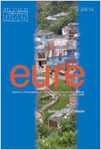Sustentabilidad urbana como planificación estratégica
DOI:
https://doi.org/10.4067/S0250-71612006000200003Palavras-chave:
desarrollo urbano, planificación urbana, política urbana, sustentabilidad urbanaResumo
Desde sus orígenes en el informe Brundtland, el desarrollo sustentable era proyectado como una actividad más apropiada y más efectiva a escala local. Esta localización del fenómeno era central al pensamiento del Programa Local 21. A pesar de múltiples iniciativas alrededor del mundo, es claro que las aplicaciones locales en áreas metropolitanas que operan sin un marco orientado hacia la sustentabilidad a escala de la ciudad se verán probablemente enfrentadas con serios obstáculos. Sin disminuir la importancia de iniciativas locales, es clave que la sustentabilidad se establece en el corazón de la planificación de escala metropolitana. Más específicamente, el rol de la planificación urbana estratégica tiene traslapes importantes con las pretensiones de la agenda de sustentabilidad, como los altos niveles de participación, horizontes de largo plazo y toma de decisiones en forma integrada más que sectorialmente. Este artículo enfatiza estos traslapes y las potencialidades para entender la sustentabilidad urbana como una plataforma conceptual para la planificación urbana estratégica. Varias experiencias de planificación estratégica metropolitana están consideradas, en particular el caso de Santiago de Chile.Downloads
Publicado
Como Citar
Edição
Seção
Licença
Copyright (c) 2006 Revista EURE - Revista de Estudios Urbano Regionales

Este trabalho está licenciado sob uma licença Creative Commons Attribution 4.0 International License.
Al momento de aceptar la publicación de sus artículos, los autores deberán formalizar la cesión de derechos de autor a EURE, según las condiciones establecidas por la Revista.
Ésta establece que el autor autoriza a EURE de manera gratuita, exclusiva e ilimitada a reproducir, editar, publicar, distribuir, publicitar, comercializar y traducir el artículo, a cualquier soporte conocido o por conocer y desarrollar.
Del mismo modo, los autores aseguran que el artículo propuesto es original, no publicado y no propuesto para tal fin a otro medio de difusión.


